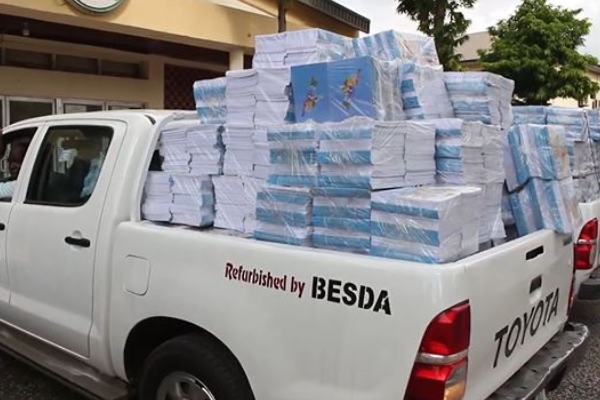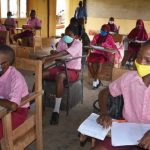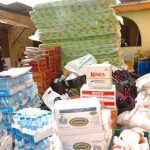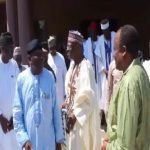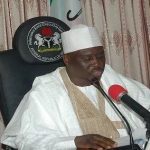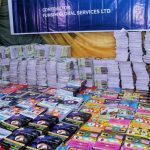The World Bank has distributed more than 110,000 textbooks and other educational materials to Primary two students in the 909 formal learning centers in Adamawa State as part of Better Educational Services Delivery for All (BESDA).
It also gave 21 refurbished Hilux Jeeps to local government secretaries for effective monitoring and supervision.
According to recent data released by the United Nations Children Fund (UNICEF), 18.5 million Nigerian children are not attending school.
According to the African Centre for Leadership Strategy Development, a non-governmental organisation, the North-East region accounts for nearly 60% of these children in the country.
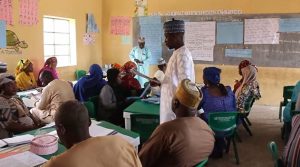
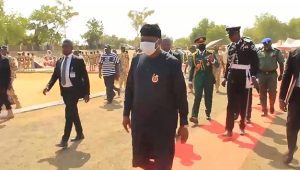
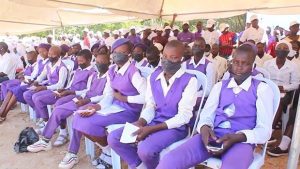
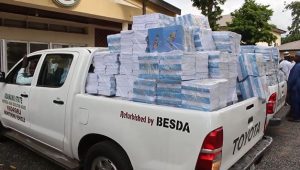
The figure may not be unconnected with the 10-year insurgency war.
The decline in primary school enrollment inherited by Gov Ahmadu Umaru Fintiri, has been of concern to the stakeholders in educational sector.
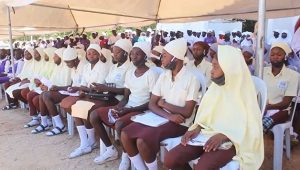
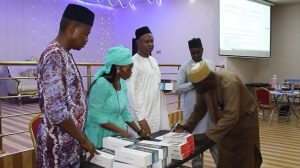
The government has already rolled out different policies to address the trend.
One of such policies involves the state primary education board mandated to being together stakeholders in education from outside the state.
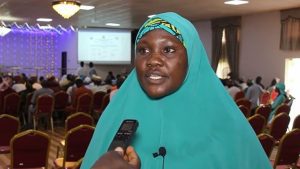
The primary education is currently partnering with the World Bank in order to guarantee that all school-age children return to the classrooms in a welcoming environment.
Beneficiaries of the items were urged to use the materials for the purpose they were given.
The Fintiri government is working nonstop to make up for lost ground in the education sector that has been eroded by insurgency.
It is attempting to rebuild a number of demolished schools and see to it that all teachers are prepared.
The World Bank has distributed more than 110,000 textbooks and other educational materials to Primary two students in the 909 formal learning centers in Adamawa State as part of Better Educational Services Delivery for All (BESDA).
It also gave 21 refurbished Hilux Jeeps to local government secretaries for effective monitoring and supervision.
According to recent data released by the United Nations Children Fund (UNICEF), 18.5 million Nigerian children are not attending school.
According to the African Centre for Leadership Strategy Development, a non-governmental organisation, the North-East region accounts for nearly 60% of these children in the country.




The figure may not be unconnected with the 10-year insurgency war.
The decline in primary school enrollment inherited by Gov Ahmadu Umaru Fintiri, has been of concern to the stakeholders in educational sector.


The government has already rolled out different policies to address the trend.
One of such policies involves the state primary education board mandated to being together stakeholders in education from outside the state.

The primary education is currently partnering with the World Bank in order to guarantee that all school-age children return to the classrooms in a welcoming environment.
Beneficiaries of the items were urged to use the materials for the purpose they were given.
The Fintiri government is working nonstop to make up for lost ground in the education sector that has been eroded by insurgency.
It is attempting to rebuild a number of demolished schools and see to it that all teachers are prepared.
The World Bank has distributed more than 110,000 textbooks and other educational materials to Primary two students in the 909 formal learning centers in Adamawa State as part of Better Educational Services Delivery for All (BESDA).
It also gave 21 refurbished Hilux Jeeps to local government secretaries for effective monitoring and supervision.
According to recent data released by the United Nations Children Fund (UNICEF), 18.5 million Nigerian children are not attending school.
According to the African Centre for Leadership Strategy Development, a non-governmental organisation, the North-East region accounts for nearly 60% of these children in the country.




The figure may not be unconnected with the 10-year insurgency war.
The decline in primary school enrollment inherited by Gov Ahmadu Umaru Fintiri, has been of concern to the stakeholders in educational sector.


The government has already rolled out different policies to address the trend.
One of such policies involves the state primary education board mandated to being together stakeholders in education from outside the state.

The primary education is currently partnering with the World Bank in order to guarantee that all school-age children return to the classrooms in a welcoming environment.
Beneficiaries of the items were urged to use the materials for the purpose they were given.
The Fintiri government is working nonstop to make up for lost ground in the education sector that has been eroded by insurgency.
It is attempting to rebuild a number of demolished schools and see to it that all teachers are prepared.
The World Bank has distributed more than 110,000 textbooks and other educational materials to Primary two students in the 909 formal learning centers in Adamawa State as part of Better Educational Services Delivery for All (BESDA).
It also gave 21 refurbished Hilux Jeeps to local government secretaries for effective monitoring and supervision.
According to recent data released by the United Nations Children Fund (UNICEF), 18.5 million Nigerian children are not attending school.
According to the African Centre for Leadership Strategy Development, a non-governmental organisation, the North-East region accounts for nearly 60% of these children in the country.




The figure may not be unconnected with the 10-year insurgency war.
The decline in primary school enrollment inherited by Gov Ahmadu Umaru Fintiri, has been of concern to the stakeholders in educational sector.


The government has already rolled out different policies to address the trend.
One of such policies involves the state primary education board mandated to being together stakeholders in education from outside the state.

The primary education is currently partnering with the World Bank in order to guarantee that all school-age children return to the classrooms in a welcoming environment.
Beneficiaries of the items were urged to use the materials for the purpose they were given.
The Fintiri government is working nonstop to make up for lost ground in the education sector that has been eroded by insurgency.
It is attempting to rebuild a number of demolished schools and see to it that all teachers are prepared.
The World Bank has distributed more than 110,000 textbooks and other educational materials to Primary two students in the 909 formal learning centers in Adamawa State as part of Better Educational Services Delivery for All (BESDA).
It also gave 21 refurbished Hilux Jeeps to local government secretaries for effective monitoring and supervision.
According to recent data released by the United Nations Children Fund (UNICEF), 18.5 million Nigerian children are not attending school.
According to the African Centre for Leadership Strategy Development, a non-governmental organisation, the North-East region accounts for nearly 60% of these children in the country.




The figure may not be unconnected with the 10-year insurgency war.
The decline in primary school enrollment inherited by Gov Ahmadu Umaru Fintiri, has been of concern to the stakeholders in educational sector.


The government has already rolled out different policies to address the trend.
One of such policies involves the state primary education board mandated to being together stakeholders in education from outside the state.

The primary education is currently partnering with the World Bank in order to guarantee that all school-age children return to the classrooms in a welcoming environment.
Beneficiaries of the items were urged to use the materials for the purpose they were given.
The Fintiri government is working nonstop to make up for lost ground in the education sector that has been eroded by insurgency.
It is attempting to rebuild a number of demolished schools and see to it that all teachers are prepared.
The World Bank has distributed more than 110,000 textbooks and other educational materials to Primary two students in the 909 formal learning centers in Adamawa State as part of Better Educational Services Delivery for All (BESDA).
It also gave 21 refurbished Hilux Jeeps to local government secretaries for effective monitoring and supervision.
According to recent data released by the United Nations Children Fund (UNICEF), 18.5 million Nigerian children are not attending school.
According to the African Centre for Leadership Strategy Development, a non-governmental organisation, the North-East region accounts for nearly 60% of these children in the country.




The figure may not be unconnected with the 10-year insurgency war.
The decline in primary school enrollment inherited by Gov Ahmadu Umaru Fintiri, has been of concern to the stakeholders in educational sector.


The government has already rolled out different policies to address the trend.
One of such policies involves the state primary education board mandated to being together stakeholders in education from outside the state.

The primary education is currently partnering with the World Bank in order to guarantee that all school-age children return to the classrooms in a welcoming environment.
Beneficiaries of the items were urged to use the materials for the purpose they were given.
The Fintiri government is working nonstop to make up for lost ground in the education sector that has been eroded by insurgency.
It is attempting to rebuild a number of demolished schools and see to it that all teachers are prepared.
The World Bank has distributed more than 110,000 textbooks and other educational materials to Primary two students in the 909 formal learning centers in Adamawa State as part of Better Educational Services Delivery for All (BESDA).
It also gave 21 refurbished Hilux Jeeps to local government secretaries for effective monitoring and supervision.
According to recent data released by the United Nations Children Fund (UNICEF), 18.5 million Nigerian children are not attending school.
According to the African Centre for Leadership Strategy Development, a non-governmental organisation, the North-East region accounts for nearly 60% of these children in the country.




The figure may not be unconnected with the 10-year insurgency war.
The decline in primary school enrollment inherited by Gov Ahmadu Umaru Fintiri, has been of concern to the stakeholders in educational sector.


The government has already rolled out different policies to address the trend.
One of such policies involves the state primary education board mandated to being together stakeholders in education from outside the state.

The primary education is currently partnering with the World Bank in order to guarantee that all school-age children return to the classrooms in a welcoming environment.
Beneficiaries of the items were urged to use the materials for the purpose they were given.
The Fintiri government is working nonstop to make up for lost ground in the education sector that has been eroded by insurgency.
It is attempting to rebuild a number of demolished schools and see to it that all teachers are prepared.
The World Bank has distributed more than 110,000 textbooks and other educational materials to Primary two students in the 909 formal learning centers in Adamawa State as part of Better Educational Services Delivery for All (BESDA).
It also gave 21 refurbished Hilux Jeeps to local government secretaries for effective monitoring and supervision.
According to recent data released by the United Nations Children Fund (UNICEF), 18.5 million Nigerian children are not attending school.
According to the African Centre for Leadership Strategy Development, a non-governmental organisation, the North-East region accounts for nearly 60% of these children in the country.




The figure may not be unconnected with the 10-year insurgency war.
The decline in primary school enrollment inherited by Gov Ahmadu Umaru Fintiri, has been of concern to the stakeholders in educational sector.


The government has already rolled out different policies to address the trend.
One of such policies involves the state primary education board mandated to being together stakeholders in education from outside the state.

The primary education is currently partnering with the World Bank in order to guarantee that all school-age children return to the classrooms in a welcoming environment.
Beneficiaries of the items were urged to use the materials for the purpose they were given.
The Fintiri government is working nonstop to make up for lost ground in the education sector that has been eroded by insurgency.
It is attempting to rebuild a number of demolished schools and see to it that all teachers are prepared.

